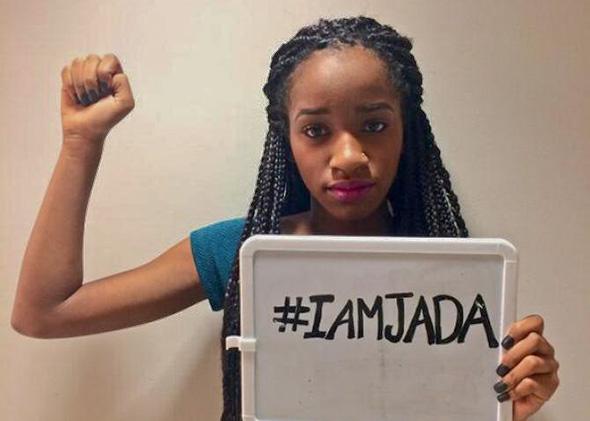In July, a Houston teenager named Jada went to a party, passed out, and woke up to discover that she may have been sexually assaulted—after she saw photos of the event plastered all over the internet. One photograph, of Jada naked on the floor, spread across social media in the form of a viral joke. Enough people found the photo so hilarious that it inspired memes, the mocking hashtag #jadapose, and even a rap song. But Jada bravely pushed back, going to the media with her story and refusing to accept these attempts to dehumanize her. Jada’s supporters countered with a new hashtag, #IAmJada, dedicated to seeking justice for victims of sexual assault.
Now, two young men have been arrested and charged with sexual assault in Jada’s case: a 19-year-old man, who has been charged as an adult, and a 16-year-old boy, who’s been charged as a juvenile. CBS News reports that the 19-year-old turned himself in after the 16-year-old was arrested.
The arrests are a testament to how national media attention to these crimes can have a positive impact. It’s an important reminder in the wake of the Rolling Stone debacle, which has raised fears that rape is just too sensitive and ambiguous to report on unless it’s been adjudicated in the courts. Last week, Joe Scarborough at MSNBC applied that lesson to Bill Cosby, and argued that journalists should refuse to report on rape cases where arrests haven’t been made. “I do know that to have someone come forward 40 years later, with a man who’s never been charged, and then for the media to immediately put it out there and for it go viral and then to have it happen over and over again,” he complained, pointing his finger for emphasis. “And then to finish reading, every time, ‘Bill Cosby has never been charged.’” When Mika Brzezinski asked, angrily, “But do we not report it?”, Scarborough replied, “I don’t think we should.”
But Jada’s case shows why it’s so critical for alleged rape victims to tell their stories in mainstream media spaces. When reported on appropriately and with due diligence, these stories draw attention to all of the reasons why sexual assault is so rarely prosecuted successfully. And in many cases, alleged assailants and their supporters have plenty of power to craft their own narratives. In Jada’s case, they had the power to humiliate her through social media. In Cosby’s case, his accusers say that his wealth and fame protected him from the law. Giving alleged victims space to tell their stories is one way to give them some of that power back.
I shudder to think of what could have happened to Jada if she’d been stonewalled, per Scarborough’s proposed rules, from telling her side of the story to the media back in July, when the abuse was at its worst. We don’t know if the media pressure helped lead to these arrests, but what we do know, from Jada herself, is that the media attention helped her cope personally with the harassment, and keep fighting for justice. On MSNBC, Jada told Ronan Farrow, “From my community, there’s very little support still [from] the teenagers,” even after the arrests. But “people outside of my community are very supportive.” Now, Jada says, “I’m just grateful and thankful for everyone who followed and supported me.”
